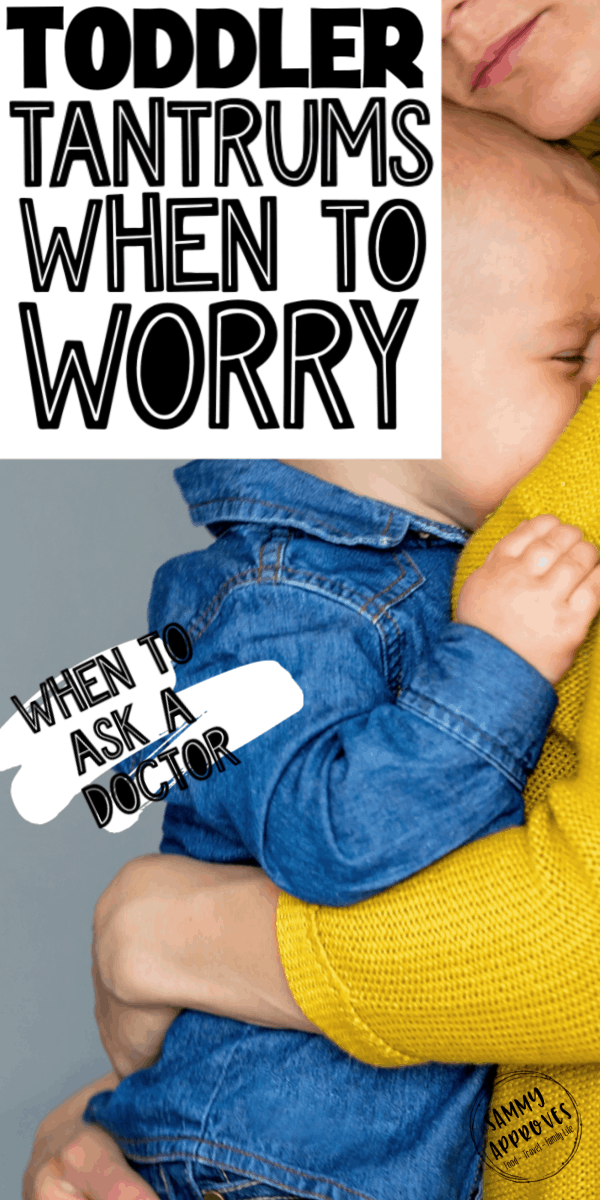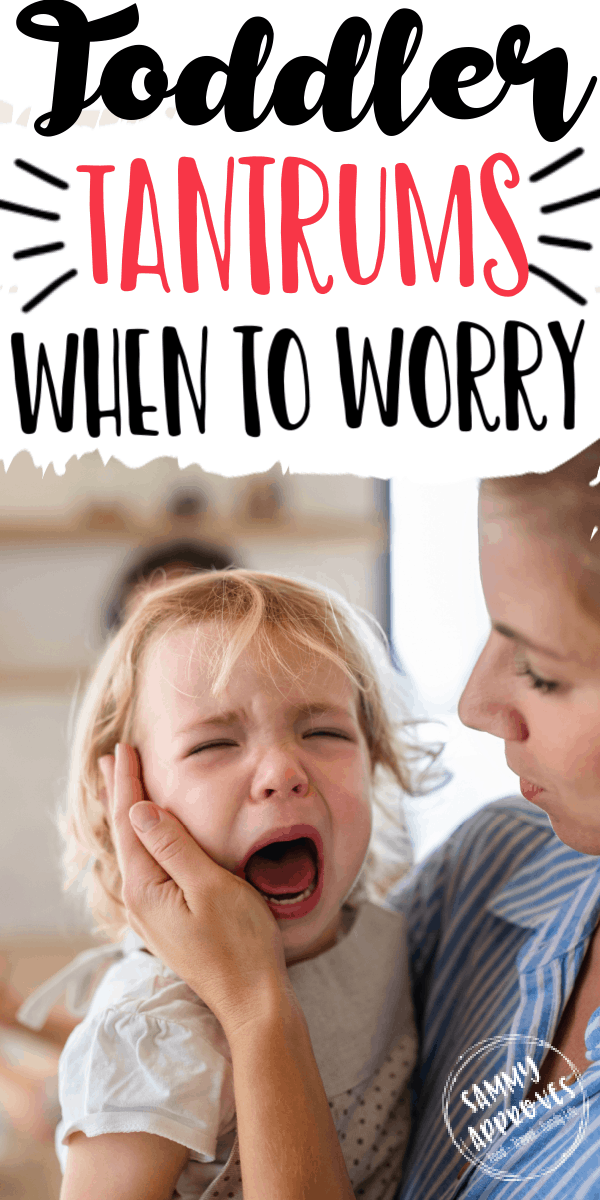Since toddler tantrums can turn pretty ugly, I’m sure all parents wonder at some point when to worry.
We all have our own toddler tantrum horror stories.
My toddler once threw herself into a raging fit at the checkout at Target and somehow managed to scoot herself under the checkout counter.
As much as I wanted to grab her and leave right there I had to hold it together while I purchased diapers I desperately needed for the fussy baby in my arms. (This was a Horrible mom moment)

At what age should a child stop having tantrums?
According to the National Association of School Psychologists tantrums start to decrease after the age of three. However, it can still be perfectly normal for your child to have a tantrum here and there.
When should I worry about toddler tantrums?
Toddler tantrums are normal and there are a lot of positive strategies to prevent and stop toddler tantrums from occurring.
Here are some signs that it’s time to call a therapist or pediatrician for further advice.
- Your child is having constant tantrums
- Your child’s tantrums are violent
- Your child is harming others or self-harming during tantrums
- Your child is having several tantrums at school or daycare
The Journal of Pediatrics suggests that if your child is exhibiting these behaviors it may be a sign of depression or other psychiatric issues.
How should I prepare for a doctors visit about my child’s tantrums?

There are several things you should do in preparation leading up to your doctor appointment about your child’s temper tantrums.
Start a journal about their temper tantrums recording:
- How often tantrums are occuring?
- Where do tantrums occur?
- Can you pinpoint anything that triggers your child’s tantrums?
- What behaviors are concerning to you? Did your child become violent or harmful to themselves or others?
- Is there anything going on in their environment at home, school, or daycare that might make the behavior worse?
Has their been a death in the family, any abuse, bullying, a divorce, a recent move?
What should I do if my toddler becomes violent or destructive?

If your child is having violent, destructive, or self-harming behaviors during their tantrums you should start working with your doctor or therapist on solutions to help your child.
In the meantime:
- Be calm– Stay calm during your child’s tantrums, even if they become destructive or violent. If you lose your temper this could make the situation worse.
These positive parenting solutions might help get you on the right track. - Try short timeouts– Try to give your child a short timeout in a boring space where there aren’t things they can throw or damage.
Give them room to breath and calm down without hurting anything. Remember to be consistent with timeouts and adjust as needed to fit your child’s needs. - Give lots of positive reinforcement– Reinforce EVERY good behavior your child has. Use things they LOVE as incentives for positive reinforcement.
You can give positive reinforcement through hugs, verbal praise, or rewards.
When you have a child struggling with behavioral problems it can get easy to focus on the negative. But, positive reinforcement is important.
Naturally your children will want to repeat good behaviors that trigger praise from their parents. - Redirect– If possible redirect your toddler to another activity, object, or item that makes them happy.
Here is a list of no-screen toddler activities that might work for keeping them occupied. - Avoid triggers– Is there something that makes your child go into a tantrum?
Keep a journal about your toddler’s tantrum to see if you notice a pattern. A certain place, item, event, time during the day, or person may trigger them into a tantrum.
Until you have a plan with your child’s therapist or doctor try to avoid whatever triggers you can. - Mindfulness and Meditation– Help your child to calm down with mindfulness and meditation.
Before their next tantrum spend some quiet time with them doing yoga, meditating, or listening to music quietly. The next time they have a horrible tantrum these activities might be able to help calm them down.
You might like this list of healthy toddler habits. These might also work for redirection or practicing mindfulness.
4 year old tantrums and hitting
The U.S. National Library of Medicine advises that if your child’s tantrums are worsening after age 4 you should seek help from your pediatrician.
If you think your toddler’s tantrums are cause for worry, remember to take a deep breath and lean on your doctor or a therapist for advice. With the right treatment and strategies you’ll be back on track in no time!





Lauren
Child is 4 years old never had tantrums before started in last couple weeks also started to pee herself when was never a problem before she only wet herself sometimes at night when sleeping also noticed a change in her eating
Sammy
Hi Lauren! I would definitely consult with her pediatrician about this. Since it’s a change from her normal behavior there might be cause to worry.